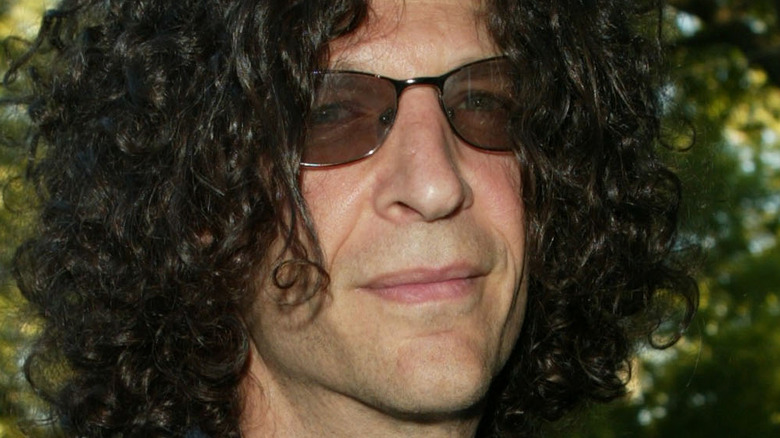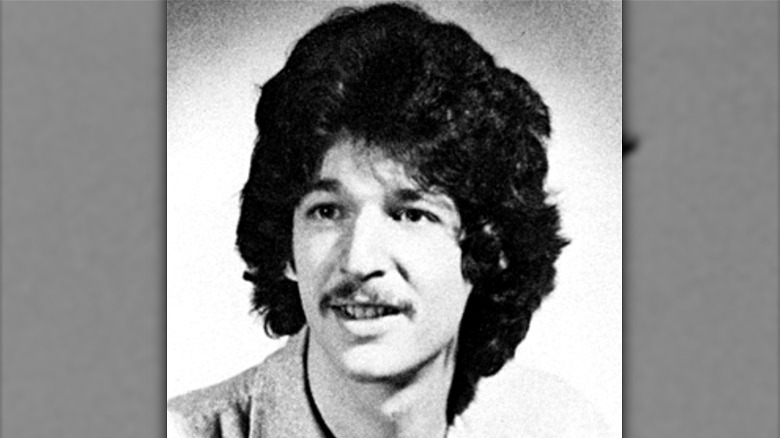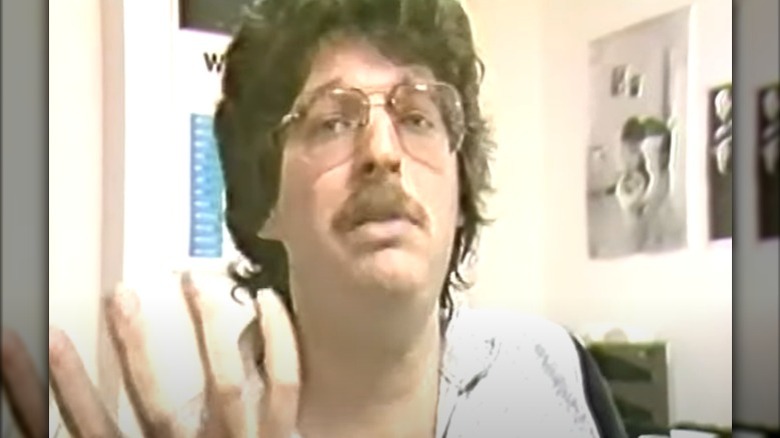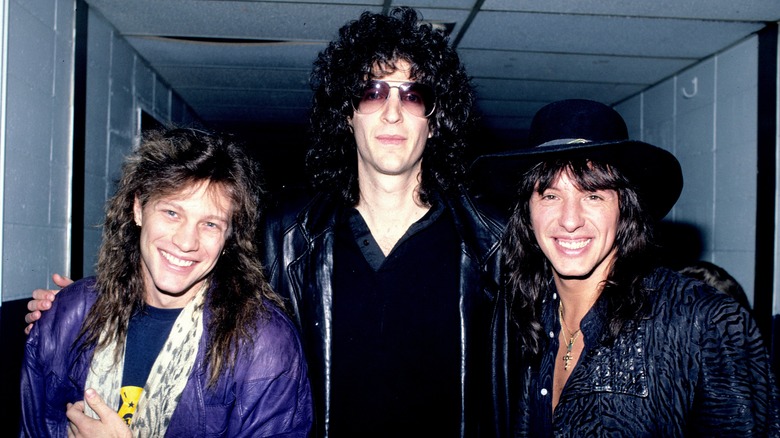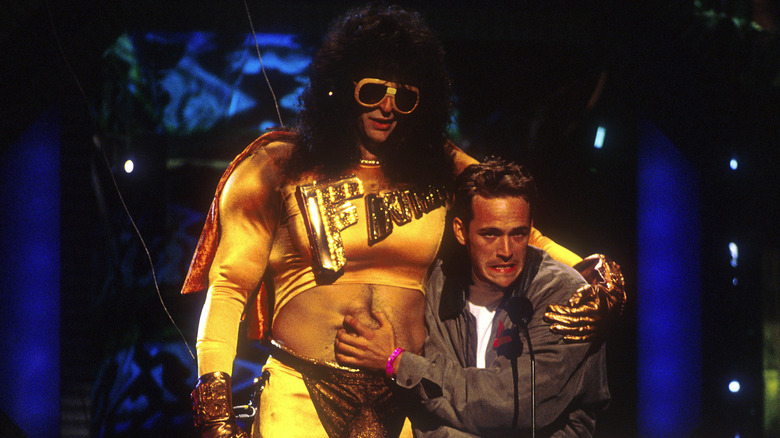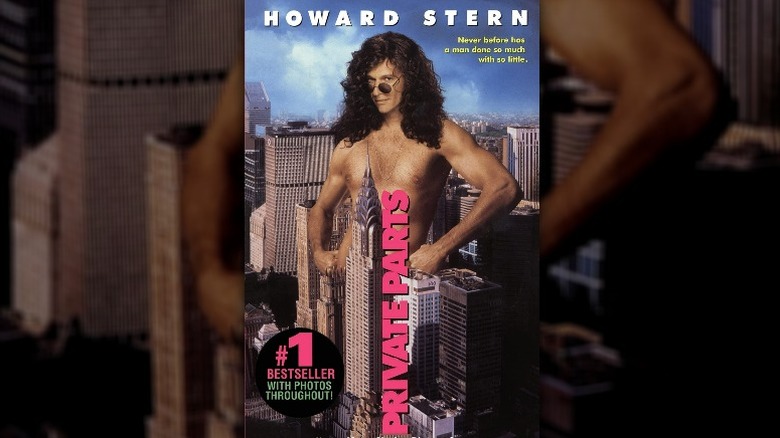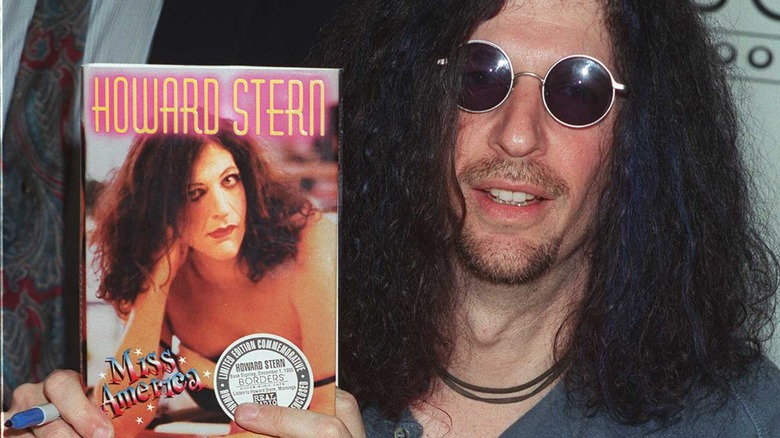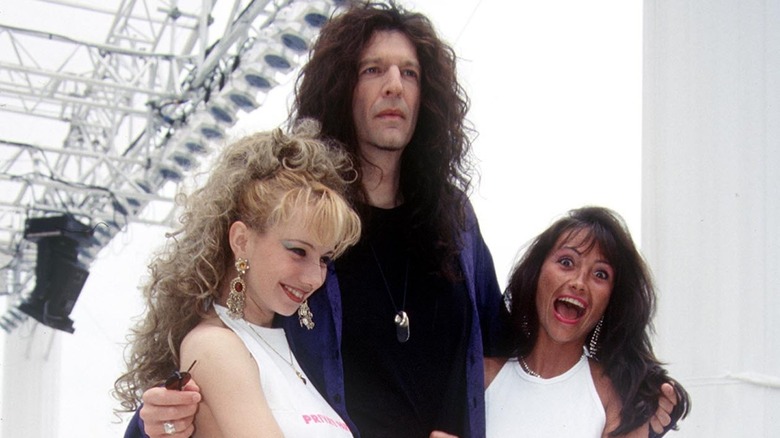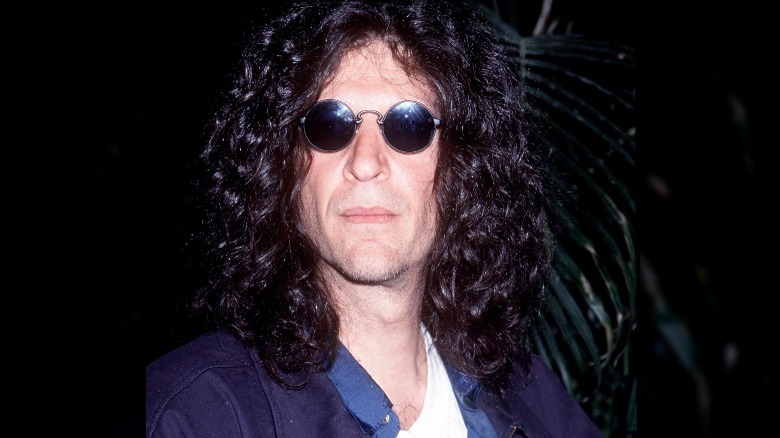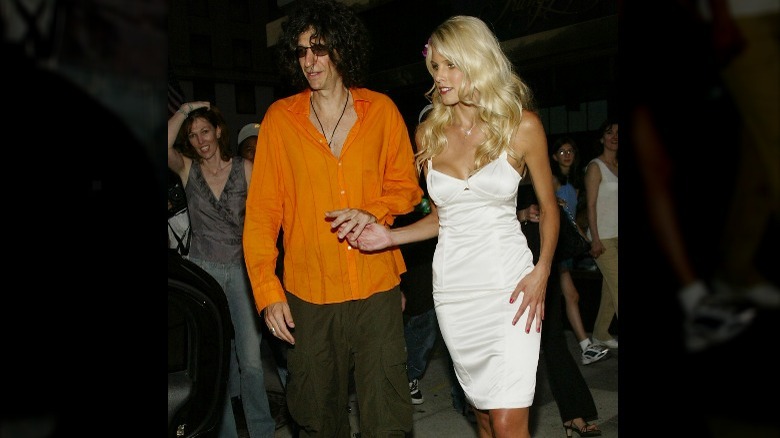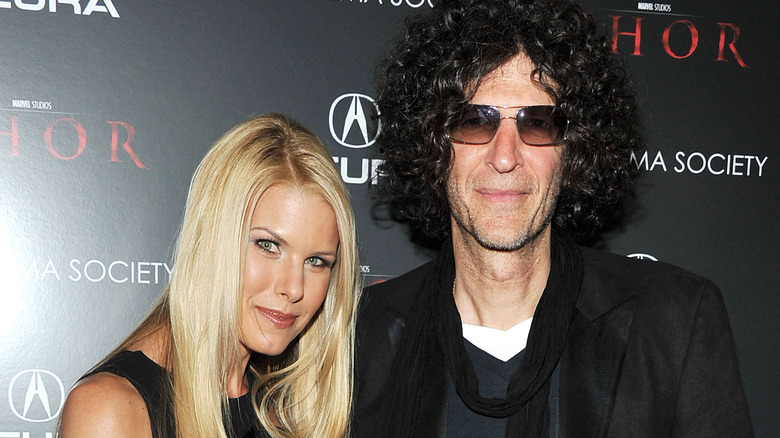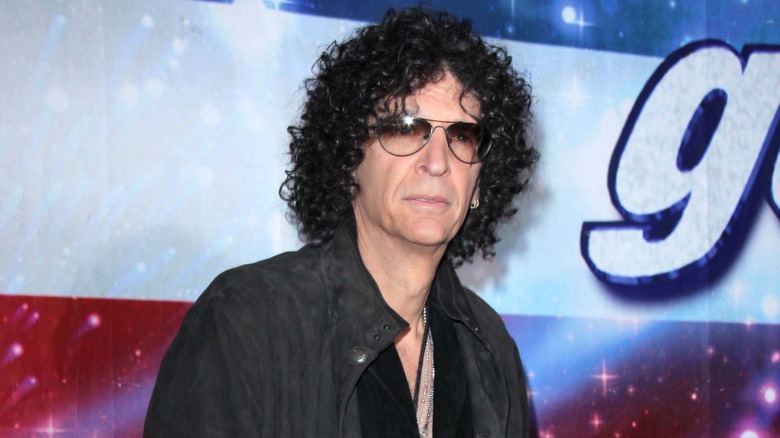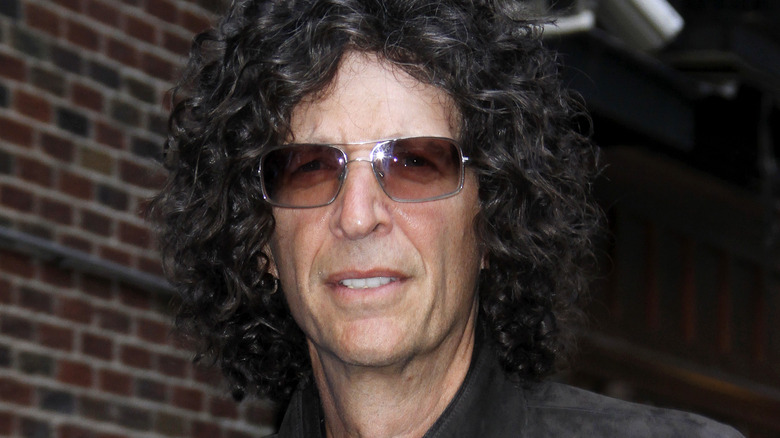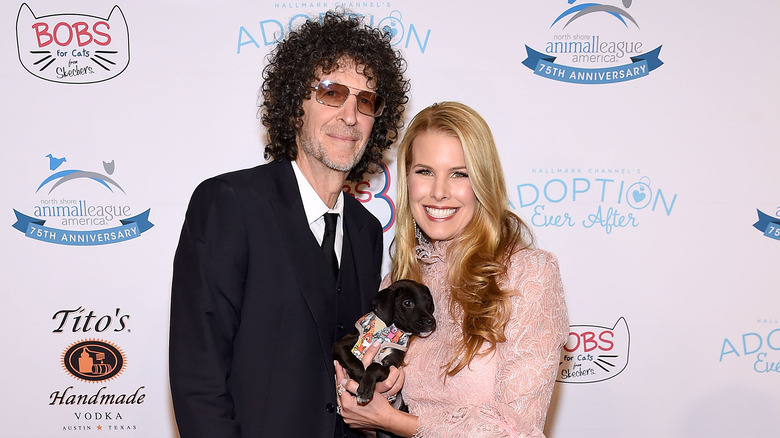The Transformation Of Howard Stern From 18 To 68 Years Old
This article contains references to suicide, hate crimes, racism, and miscarriage.
He built an entire career upon indecency, offense, and humor so dark his punchlines could blow the light out of the sun. But during the gradual transformation of Howard Stern, radio's most infamous and indelicate shock jock seemingly sealed a lid on his lewdness. To some, Stern's newfound ability to listen to his guests, rather than get lecherous with them, was a breath of fresh air. To others, the most offensive thing the pied piper of pornographic incivility has ever done is to reject his very own bawdy brand of comedy.
Growing up as an outsider in Roosevelt, Long Island, Stern described himself as being "one of about ten white kids" at his school, where he was constantly "getting beat up" for standing out, per Rolling Stone. At home, however, he found solace in comedy. According to "Howard Stern: A Biography," the future radio star would use puppets to act out "dirty performances" for his friends in a bid to make them laugh.
It worked. And while he no doubt lapped up the attention, Stern was likely also awakened to the great cathartic quality of laughter. To Rolling Stone, for instance, he shared how he was inspired to take his comedy to talk radio after watching his dad's dull work commutes, where "he'd just sit and listen to CBS News." He realized, "Wouldn't it be great if he was laughing?" Thus, he made it his mission to tickle every "miserable bastard on the parkway in his car."
If you or a loved one has experienced a hate crime, contact the VictimConnect Hotline by phone at 1-855-4-VICTIM or by chat for more information or assistance in locating services to help. If you or a loved one are in immediate danger, call 911.
The college radio rabble-rouser
But you can't just become the King of All Media overnight. In order to reach those poor miserable schmucks, Howard Stern had to first enroll at Boston University, where he studied broadcasting and film. Per Rolling Stone, he found his voice almost immediately when he started up his first profane student radio show. "We said whatever the f*** we wanted," he explained in 1990. "It sounded just like what I'm doing now."
Not that his dad was a fan. Speaking again with the outlet in the mid-'90s, Stern explained that he sent a tape of his college radio show over to his dad, only to receive the response: "You stupid idiot, this is terrible. They don't talk like that on real radio stations." Stern reasoned that the criticism helped keep him "in check," and potentially it pushed him to greatness. After all, Stern would come to influence modern radio in ways that his dad couldn't yet fathom.
The radio host's college days were also notable for introducing Stern to his future wife, Alison Berns. The New York Post describes the young couple as meeting in 1974 at a friend's house — Stern had popped by to "borrow a blow-dryer after getting caught in the rain," as you do — while Berns happened to be there. At first, she resisted his charms, but soon they were smitten. "Within a week ... I knew I was going to marry her," he told Rolling Stone.
Howard Stern's first controversies
When he left Boston University in 1976, Howard Stern grappled with the same struggles of every young creative graduate: inadequate jobs for minimal pay. Per Rolling Stone, his first job for WRNW in New York paid just $96 a week. His next, for WCCC in Connecticut, amounted to $12,000 a year. In the midst of it all was the "depressing" sight of "all these old disc jockeys walking around" like "they'd been put out to pasture." The airwaves needed a hit of energy — and Stern's indecent voice was an unrefined sugar high for the ears.
Having "gained notoriety for his naughty-boy japery," as City Journal put it, Stern's profile had risen to the point where he became the voice of "afternoon drive-time" for WNBC-AM in New York. There, Stern began his career-long professional relationship with Robin Quivers, his beloved radio sidekick. He also began his mainstream ascent into America's most controversial radio host.
After marrying Alison Berns in 1978, the disc jockey served his first major cultural shock by turning his wife's miscarriage into a pitch-black punchline on-air. Stern told listeners that he and his wife had given the late embryo a name and planned to "take him to the zoo next weekend," per Los Angeles Times. Berns, understandably, "flipped out," per Rolling Stone. In "Private Parts," she wrote that she "wanted to climb under a rock" because she was "so embarrassed" by his performance. "That was the turning point," she wrote, "I knew that nothing was off bounds."
Was Howard Stern's humor hateful?
At 31, Howard Stern established himself as America's newfound commander in chief of cultural provocation by getting himself fired from his WNBC job. According to The Washington Post, he "had two years left on a five-year contract" when he was pushed out of the gig due to "conceptual differences." As implied by the outlet, those "differences" likely had something to do with his reputation for "on-air slurs and tirades" aimed at Black people, Jewish people, the LGBTQ community, and the disabled.
Speaking to Rolling Stone, Stern suggested he was nonetheless "surprised" to be axed from the station and shared a rumor that his firing had something to do with a segment involving "Bestiality Dial-a-Date." It hardly hurt his career. Per the outlet, "there were immediate job offers" for the popular shock jock, who found a new home for his radio revolts at New York's K-Rock. There, he cultivated an audience of over 3 million listeners and fought off fierce competition to round out the mid-'80s at a ratings high.
But it wasn't without some damage along the way. Stern's 1994 cover story with Rolling Stone recounts how his "nonfans called him racist and misogynous" based on his offensive "comic transgressions." A charge which he fiercely denied, telling the outlet that his jokes had nothing to do with an aversion to any particular group. "I don't do it out of hatred," he reasoned, "I do it because I think it's funny." Still, not everyone was laughing.
The adventures of Fartman
By 1990, Howard Stern's reputation for humor that Rolling Stone suggested had "sometimes fairly" been described as homophobic, racist, and tasteless had apparently struck a chord with millions. Per Los Angeles Times, the star's "outrageous morning show" was now set to broadcast in Los Angeles. Within a year, he became the first radio personality to score a No. 1 show simultaneously in both New York and L.A.
Still, with great popularity comes great scrutiny, and in 1992, the Federal Communications Commission slapped "a record $600,000 fine" on the broadcasting corporation behind Stern's show. According to Los Angeles Times, the penalty was triggered by a "19-page complaint" against the host's "raunchy, sexually oriented broadcasts," with a concern that young people were listening to the show.
One such youth appeared to confirm those concerns to the outlet, stating that most teens tended "to worship" Stern, whom they described as "a 14-year-old at heart." It was a fair observation, considering that for his next act, the King of All Media flew onto the stage at the 1992 MTV VMAs as "Fartman" — a spandex-clad, windy warrior with exposed butt cheeks, which he requested a reluctant Luke Perry to touch "for power." Should there be any doubt as to Stern's legitimate "power" at this time, it can be found in the fact that New Line Cinema once optioned "The Adventures of Fartman" as a feature film aimed at the very same teenagers the FCC was hoping to protect.
The dark prince of radio
By the '90s, Howard Stern had become a millionaire, and he found a way to capitalize further on his ever-increasing fame during the era. In 1993, he released "Private Parts," a salacious, best-selling autobiography, which caused a "near-riot" at a New York book signing event. According to Los Angeles Times, the comedian was mobbed by an estimated 10,000 fans awaiting him.
Rolling Stone detailed a similar scene at a West Coast book signing, where the outlet described him as being dressed in an all-black ensemble with black shades while being mobbed by "wild-eyed devotees." It's a look that became a staple during his shock jock years, and one which hinted at the depths of his insecurities.
In one interview, Stern described himself as "a cross between Big Bird and Joey Ramone," while in a Rolling Stone feature, he proclaimed his physical discomfort so great he sometimes wanted "to throw up" when he looked in the mirror. This was a man whose humor feasted on darkness. But he'd arguably seen that darkness within himself too, and he'd turned it outward, like armor. Regardless, he flexed an ego as big as his hair. In 1994, the then-40-year-old announced his candidacy to become governor of New York, only to brag, "I'll get out of office before I can really s**** anything up," per The New York Times. He didn't make it to office — by August, he'd quit the governor race over a refusal to disclose his finances.
The good, the bad, and the mouth in the middle
By the mid-'90s, Howard Stern had hit his peak era of provocation — one that showcased the anarchic darkness at the heart of his show. His jokes could be tasteless and cruel, but in Stern's opinion, his show was as much about him "trying to be funny" as it was him "trying to tell the truth," per Rolling Stone. His bare-all approach to talk radio meant nothing was off-limits. For better or worse, it resulted in a show of extremes.
In 1995, for instance, Stern chose to follow up the death of iconic Tejano singer Selena by playing excerpts of her music "with gunshots in the background" and cracking jokes targeting Mexican-Americans, per UPI. He apologized, but the damage was done — in South Texas, a warrant was issued for Stern charging him with disorderly conduct.
A year earlier, however, Stern saved a man from suicide live on-air after he decided to "keep this man laughing ... until the cops" could arrive, as reported by Los Angeles Times. Both extremes demonstrated Stern's immense power as a broadcaster. The question was, how would he continue to use this power? For now, one answer was simply: Make a lot more money. In 1995, Stern released his second book, "Miss America" — another best-selling tome that Los Angeles Times called "raunchier" than his first book. During promotional duties, Stern maintained his signature style — hiding beneath shades and hair.
If you or anyone you know is having suicidal thoughts, please call the National Suicide Prevention Lifeline at 1-800-273-TALK (8255).
Howard Stern goes to Hollywood
Having conquered the airwaves and cornered the book market, Howard Stern headed to Hollywood, where a movie adaptation of "Private Parts" attempted to retool his persona. He played himself in the film, and The New York Times noted, "His jokey, ingratiating performance ... transforms him from the scourge of the airwaves to a sweetheart of the screen."
Speaking to Rolling Stone, Stern professed that expressing this side of himself was entirely the goal. "I'm not just a guy who tells p***y and d*** jokes all f***in' morning," he said, "there is some intelligence behind it." Tellingly, the radio host also suggested that "the movie is really a love letter to my wife," whom he described to the outlet as a woman "willing ... to go along with this wacky career." As Roger Ebert put it in his favorable review of the movie, "Private Parts" certainly celebrated Alison Berns, but also posited "as its underlying subplot, 'How much will this woman put up with before she dumps him?'" Sadly for Stern, he'd soon discover the answer to that question.
As the radio host ended the '90s, he remained on a career-high. In 1998, he finally scored himself a TV-MA-rated, late-night television show called "The Howard Stern Radio Show." And a year later, his power status was confirmed when he was ranked 27th on the very first Forbes Celebrity 100 list.
What shocks a shock jock? Divorce, apparently...
In 1999, it finally happened: Howard Stern split from his wife, Alison Berns. Described as "an amicable separation" by the couple's spokesman, the New York Post reported that the shock jock had "always vowed he would never cheat on his wife," in spite of how his on-air antics with female guests might have suggested otherwise. Instead, the outlet suggested that Stern's "workaholic ways" had caused the split. In later years, he appeared to confirm this theory.
"I was totally neurotic and ... consumed with work," he told Rolling Stone, "I took work as the most important thing and the only thing." Adding to the problem was the fact that his work also involved putting his private life on the line in the name of entertainment. In 1994, Stern had acknowledged to the outlet that sharing everything with his audience was a problem for his wife and three daughters. He added, tellingly, "Within the last year, it's started getting to my wife."
For a year, he enjoyed an "unhealthy ... feeding frenzy" of sex in his newly single life, which he reasoned was "childish" and which left him feeling "empty," per Rolling Stone. In 2000, Stern would remove his face from the bachelor trough and find a stable, monogamous relationship once again — this time with model and animal rights advocate Beth Ostrosky, whom fans of Stern's would come to know as "the lovely Beth O," per MTV.
The Howard Stern productions that never were
As the new millennium pushed forward, Howard Stern dabbled once again with wielding his cultural power beyond his radio show. In 2002, he acquired the remake rights to the raunchy cult comedies "Rock'N'Roll High School" and "Porky's." Working as an executive producer for the projects, the films would also be released under the banner of "Howard Stern Presents," per Billboard.
This, Stern explained, would give the films a confirmation of quality to his fans. "It means something to them," he told the outlet. "They know I'm not going to be giving them any schlock." And he didn't — because the films never happened. In 2004, Daily Variety reported yet another doomed project involving the star. "Howard Stern: The High School Years," an animated series about the star's hideous teen years, never made it to TV (via UPI).
Regardless, it wasn't all false starts. In 2000, he executive produced "Son of the Beach," a fairly successful spoof on "Baywatch." While Los Angeles Times trilled that "you know the drill" with anything from Stern — "Babes. Lingerie. Sex jokes. Bad taste" — ultimately, the outlet noted that the show was surprisingly "good-natured" and "really, really fun." Unfortunately, the series was canceled after three seasons on FX, per IMDb – maybe the King of All Media was better off sticking to just the one media?
King of all media™
In 2004, Howard Stern received another "record fine for on-air indecency" courtesy of the Federal Communications Commission, which The Guardian reported as being "as large as $1.75m." Thus an end to the comedian's time on terrestrial radio was ushered in, and Stern made a lucrative jump to satellite radio instead. Per People, the star moved to Sirius XM and signed a massive "five year, $500 million contract" in doing so.
The move to satellite radio opened Stern's show up to all manner of infantile, explicit content, which could now be aired with total impunity. Today reported that within the first year of being on Sirius XM, a comedy writer "had his genitals waxed on air," while adult star Jenna Jameson "inaugurated the in-studio Sybian, a saddle-like sex toy since utilized by many female guests" live on-air. It was, they suggested, "the best radio on the airwaves."
Now in his 50s, Stern was dressing a little more like the multimillion-dollar mouth he was. For the most part, he was still burying himself in a monotone of funeral hues, but there was also a roguish elegance to his look: This was a man who was perhaps learning how to accept himself, flaws and all. It likely helped that he was a bonafide Somebody now. In 2006, Stern filed a trademark for his nickname, "King of All Media," and was also listed in both the Time 100 and the Forbes Celebrity 100.
The shock jock joins a family show
Howard Stern once said to Rolling Stone that he'd never "be accepted by legitimate media." And yet, by 2011, radio's most foul-mouthed outcast unexpectedly became part of the same establishment he railed against when he replaced Piers Morgan as a panel judge on "America's Got Talent." On "The Howard Stern Show," the host announced the news by suggesting that the show "has a little too much nonsense" to it, and he was eager to put a stop to it.
Reactions to the news were mixed, to say the least. Today reasoned that Stern was "perfect" for the show because, in spite of his raunchy career, he's a great entertainer who's a family man at heart. On the contrary, Forbes suggested Stern was "a terrible choice" for the show and a potentially "big waste of money" based on his core demographic of fans likely being uninterested in watching a wholesome reality competition.
But then, it was possible that Stern was slowly edging away from his former personality and reputation, and arriving closer to something better resembling "wholesome," himself. In 2007, the comedian got engaged to his girlfriend, Beth Ostrosky, and the two were married a year later. Whether or not getting hitched again and joining such a mainstream show had an impact on the more extreme side of his personality is up for debate: But he certainly appeared to soften from here on out.
Mainstream approval and a quieter life
Should anyone have had any doubts as to whether Howard Stern had been fully embraced by the establishment or not, they were likely cleared when he was inducted into the National Radio Hall of Fame. Having been excluded by the Hall for decades, he wasn't exactly grateful or impressed with his sudden addition, however. On his radio show, Stern questioned the "credibility" of the Hall and the people who decide "who should go in" and who shouldn't (via Boston.com).
Considering the size of his bank account, you'd think he wouldn't much care either way. In 2015, Forbes listed him as America's highest-paid media personality, raking in an impressive $95 million from his radio and TV host gigs. That same year, having achieved everything he wanted to on the show, Stern left "America's Got Talent" to refocus on radio. In a farewell segment, he shared how being "on a family show" was likely "the most shocking" part of his consistently controversial career (via The Hollywood Reporter.
It may also have been healing for him, based on his own difficult beginnings. "I was told over and over again that I had no talent," he said, adding that he wanted to be a judge so he could "take someone who was struggling and seriously give advice." Having admitted to Rolling Stone that he'd done a lot of work on himself in therapy to keep his narcissism "in check," a new and improved Stern stepped into the limelight.
The Mellowing of media's biggest bad boy
Somewhere along the way, Howard Stern went from being radio's biggest bad boy to a more considerate media figure: one "who calls his house 'Catnado'" during spring and summer, due to the number of kittens fostered by him and his wife every year, per Daily News. By the time his third book, "Howard Stern Comes Again," was released, the radio host was denouncing his past incarnation as a shock jock, calling the Stern of the "Private Parts" era "a selfish pr***" to Rolling Stone.
His despair over his former behavior was so prominent that he even wrote in his new tome, "I'm not proud of my first two books. Do me a favor and burn them" (via Toronto Sun). Reviews of his third book likewise reflected and celebrated the transformation of Stern. The Washington Post praised this "kinder, gentler shock jock" while The New York Times celebrated the shift of perspective within the interview collection, writing, "Howard Stern can talk. This book shows he's also a good listener."
But not every fan was quite so happy about his softened evolution. City Journal complained that having "once squeezed laughs out of his narcissism," Stern's "narcissism now takes the form of tiresome bragging about having purportedly surmounted it." Funny or not, Stern was laughing all the way to the bank. In 2020, he signed a new deal with Sirius XM reportedly worth $500 million, per Page Six. The shock jock turned polite proprietor isn't stopping anytime soon.

